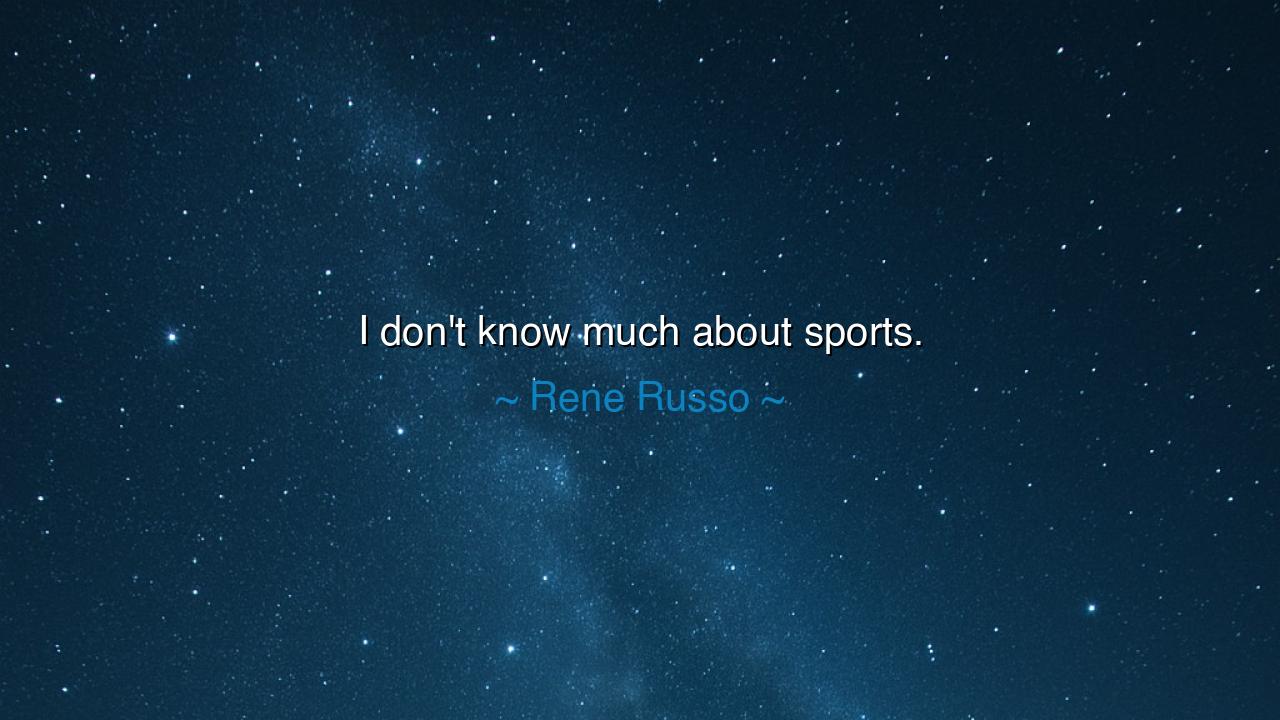
I don't know much about sports.






Hearken, O children of curiosity and humility, and attend the simple yet profound words of Rene Russo: “I don't know much about sports.” Though these words appear modest, even casual, they carry a timeless wisdom: that true understanding begins with the recognition of one’s own limits, and that honesty about knowledge and ignorance is itself a virtue of the highest order.
The origin of this insight lies in the observation of human nature. Russo, an actress and observer of life, acknowledges a gap in her understanding—not out of shame, but with clarity and grace. She reminds us that mastery of all domains is impossible, and that each soul must discern where its expertise lies. To admit, openly, “I do not know” is a declaration of self-awareness, and a step toward genuine learning, for one cannot grow in fields unacknowledged.
Consider the story of Socrates, who wandered the streets of Athens, questioning the wise and the powerful, and yet claimed to know nothing. It was this awareness of his own ignorance that made him the wisest of men, for he sought knowledge earnestly and taught others to examine themselves. In this, Russo’s words echo a philosophy as ancient as Greece itself: acknowledgment of what we do not know is the beginning of wisdom.
Yet these words also reflect the diversity of human pursuits. One need not know sports to contribute meaningfully in other realms—art, philosophy, science, or compassion. Life offers countless arenas in which knowledge can flourish, and each soul chooses its own field of mastery. To confess ignorance in one area is not weakness, but honesty, allowing one to focus on passion and skill elsewhere, and to respect the expertise of others without envy or pretense.
In history, many have succeeded precisely because they recognized their limits. The astronomer Galileo mastered the heavens, yet humbly accepted the counsel of those more learned in certain arts of measurement. By acknowledging the boundaries of his knowledge, he avoided arrogance, built trust, and could innovate with clarity and precision. Russo’s words remind us that humility is a precondition for growth and collaboration, whether in sports, science, or human relations.
The lesson is clear: embrace your areas of ignorance as much as your areas of mastery. To say “I don’t know” is to open the door to learning, to dialogue, and to self-improvement. It is a statement that cultivates curiosity, invites guidance, and fosters mutual respect among peers. In every moment, recognition of one’s own limitations becomes a bridge to greater understanding.
Practical action follows: when faced with a domain you do not know, admit it candidly. Ask questions, observe diligently, and learn from those who possess experience. Do not feign expertise for appearance or approval, for honesty is a far stronger foundation for respect and wisdom. In this way, your life becomes a journey of authentic growth, guided not by ego, but by curiosity and humility.
Thus, let the simple words of Rene Russo endure: acknowledge what you do not know, and embrace it as a path to wisdom. Whether in sports, art, science, or life itself, the courage to confess ignorance is the first step toward enlightenment, the doorway through which understanding and humility enter the soul, and the seed from which true knowledge springs eternal.






AAdministratorAdministrator
Welcome, honored guests. Please leave a comment, we will respond soon